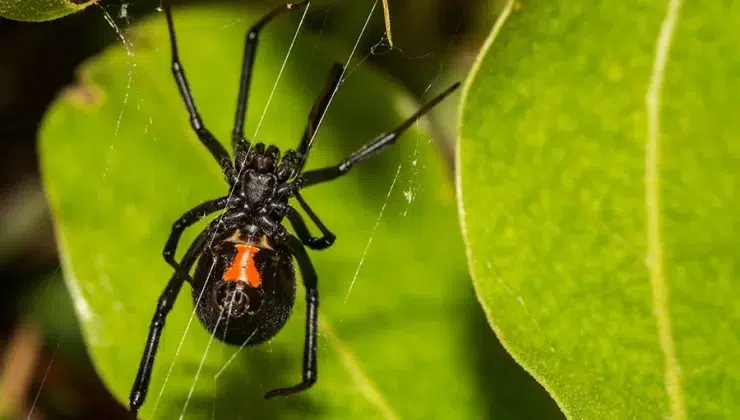How to Eliminate Aggressive House Spiders and Keep Your Home Pest-Free

Spiders running around the house can be a menace, especially when there are larger, aggressive, or venomous species like the brown recluse or black widow. When these unpleasant pests invade your home, it’s essential to deal with them immediately.
This guide offers a practical and straightforward approach to eliminating these unwelcome guests and maintaining a spider-free environment.
Step 1: Identify the Problem
Begin by understanding the type of spiders in your home. Not all spiders are harmful, but aggressive species such as the brown recluse and black widow are known for their venomous bites and reclusive nature. Bigger spiders, such as the wolf spider, don’t make webs and instead can be seen scurrying across the floor to hunt their prey. House spiders often hide in dark, undisturbed areas, such as basements, attics, and closets. Look for irregular webs, shed skins, and egg sacs as indicators of their presence.
What you need to know about aggressive house spiders to effectively deal with them:
- They’re fast and bold. You will find them sprinting across your floors at any time of the day.
- They won’t usually bite unprovoked. Most aggressive behavior is actually defensive, especially if they feel trapped.
- They’re hard to catch. They are active and on the move, making them more difficult to eliminate using standard traps.
Step 2: Eliminate Their Food Source
Spiders are more attracted to homes with a higher insect population. The first step to preventing their entry is to reduce their prey supply:
- Maintain Cleanliness: Regularly vacuum and mop floors, wipe down surfaces, and immediately clean up any food remains that can attract insects.
- Secure Food Storage: Store food in airtight containers and dispose of garbage regularly to avoid attracting pests.
- Control Humidity: Fix leaky faucets and use dehumidifiers to reduce moisture, making your home less hospitable to insects and spiders.
Step 3: Seal Entry Points
Prevent spiders from entering your home by sealing any possible entryways:
- Inspect and Repair: Check for cracks and gaps around doors, windows, and foundations. You can also use caulk or weatherstripping to seal them.
- Install Screens: Make sure all windows and vents have tight-fitting screens to block spider access.
- Use Door Sweeps: Install door sweeps on exterior doors to cover gaps at the bottom.
Step 4: Declutter and Clean Regularly
Spiders love cluttered environments. To make your home less inviting to these pests:
- Reduce Clutter: Clean and organize all storage areas, get rid of unused items, and avoid piling clothes or boxes on the floor.
- Regular Cleaning: When cleaning, make sure to vacuum corners, behind and under furniture, and pay special attention to seldom-cleaned areas. This will help remove webs and egg sacs.
Step 5: Utilize Natural Repellents
While the usual insecticide can be useful as well, several natural remedies prove to be effective spider repellents, and you can use them regularly without worrying about any harmful chemicals:
- Essential Oils: Mix water with a few drops of peppermint, tea tree, or eucalyptus oil and spray around entry points and common spider areas.
- Vinegar Solution: Combine equal parts white vinegar and water in a spray bottle and apply to cracks and crevices.
Step 6: Apply Insecticides and Traps
For more persistent spider infestations:
- Residual Insecticides: Use products containing pyrethroids to treat baseboards, corners, and other spider-prone areas.
- Sticky Traps: Place glue traps in dark corners and behind furniture to monitor and reduce spider populations.
- Diatomaceous Earth: Apply food-grade diatomaceous earth around entry points and along baseboards; it dehydrates and kills spiders upon contact.
Step 7: Modify Outdoor Lighting and Landscaping
Spiders are attracted to areas with more insects:
- Outdoor Lighting: Avoid turning on outdoor lights or instead use yellow or sodium vapor lights outdoors, which attract fewer insects, reducing spider food sources.
- Landscaping: Keep shrubs and trees trimmed away from the house, and remove debris and woodpiles near the foundation to eradicate spider habitats.
Step 8: Consult Professionals if Needed
If the infestation persists despite all your efforts, consider hiring a professional, such as a wolf spider exterminator. Experts can properly identify the specific spider species, locate their nests, and apply targeted treatments to effectively eliminate the problem.
Ready to Reclaim Your Home from Aggressive Spiders?
Maintaining a spider-free home is an ongoing process that combines vigilance, cleanliness, and proactive measures. By identifying problem areas, eliminating spider prey, sealing entry points, and utilizing traps and repellents, you create an environment that’s unwelcoming to aggressive house spiders. Regular cleaning and decluttering further reduce hiding spots, while strategic use of insecticides and traps can address persistent pest issues.
Remember, consistency is key, and if the situation gets too hairy for you, don’t hesitate to consult professional pest control services to ensure your home remains safe and comfortable.










